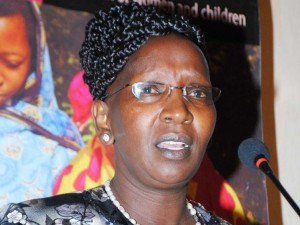
Despite the extreme pain, severe bleeding, the risk of infection and the difficulty in passing urine and menstruation, Female Genital Mutilation remains deep-rooted in many communities in the country.
FGM is illegal in Kenya and conviction attracts not less than six months in jail or a fine not less than Sh50,000.
But that has not been deterrent enough. Government statistics show 21 per cent of women aged between 14 years and 50 years have undergone FGM.
Another 96 per cent of the same age group has heard of female circumcision, according to the Demographic Health Survey 2014.
FGM is “all procedures involving partial or total removal of the external female genitalia or other injury to the female genital organs whether for cultural or any other non-therapeutic reasons”, according to WHO and Unicef.
The chairperson Anti-Female Genital Mutilation Board Linah Jebii says FGM has nearly become universal in the North Eastern region at 98 per cent compared with Eastern region with 26 per cent.
“Somali tops the prevalence of FGM among the Kenyan communities with 98 per cent, followed by Samburu with 86 per cent, Kisii 84 per cent, Maasai 78 per cent and Embu 31 percent,” says Jebii. “Whereas Luhyas and Luos have zero per cent of the practice; Meru, Kalenjin, Taita Taveta and Kikuyu still practice the vice with percentages standing at 31, 28, 22 and 15 respectively.
“I am surprised that more parents have been found trying to minimise the immediate health effects of the practice by having their daughters cut by health providers,” says Jebii.
She says the it is difficult to crack down on the practice because it has gone underground.
Ngelisen Lengopai, a reformed female circumciser in Samburu, says many families are not yet willing to ditch the vice is because it is a cash cow, a booming business.
Lengopai says cartels have invaded the practice where they steal small schoolgirls and take them for the practice and earn a commission for every child.
I use to earn Sh1,000 for cutting one girl and on average I could do between 90 and 100 girls in a month, so you can guess how much the cartels earn in the business,” she said.
She renounced the practice and became an ambassador to sensitise her society.
“My Samburu people are still holding dearly unto the vice. But majority have started embracing alternative rites of passage where they take the girls to shave and pour water on them but avoid the cut completely,” she says. She is being supported by Amref Health Africa, a local non-governmental organisation, in her campaign.
Loise Kapande Labis, a female circumciser in Oldonyonyoke village, says she was always troubled by the emotional distress, fear and feelings of helplessness of the young girls brought to her.
She started circumcising in 1995 and quit 19 years later in 2014 after she discovered the psychological complications the girls went through, including flashbacks, nightmares, anxiety and depression.
“I discovered that many young girls and women had a lot of anger and bitterness towards me and till now it bothers me. I did not realise how I had made them suffer, I hope one day I will be vindicated now that Amref has really transformed my mindset,” said Kapande.
She later trained as a traditional birth attendant.
Ananstasia Mashindana, chairperson of Enduet Women’s group in Pokot, says the struggle against FGM has been tough.
Her community once threatened to curse her and a group of other women who had vowed to defend girls.
“They threatened to put on blue clothes and pronounce us as outcasts, but the district officer, through many Barazas, stood with us. Those who threatened us were arrested and locked up in cells which drove fear hence slow acceptance of our campaigns,” said Mashindana.
She says they have saved about 1,000 girls. Two of them are in Italy for further education, one has joined a national school after scoring 412 marks in KCPE and the youngest girl is currently in class four.
Lelein Kanunga, a moran chief from Entasopia village in Kajiado county, says insecurity has made their work difficult.
He says morans are the greatest supporters of the vice. The practice will only decrease if they are fully educated with the right concepts, Kanunga says. However, about 1,000 Morans have denounced the vice.
“We are happy that the alternative rites of passage by the Amref Health Africa have so far trained and graduated 9,000 girls out of whom 8,000 are from bigger Kajiado County, 600 from Samburu, and the remaining from other areas,” says Kanunga.
Dorothy Mawshepei, who works in the deputy president’s office, says FGM violates the rights to health, security and physical integrity of any woman, and the right to be free from torture, cruel, inhuman and degrading treatment.
In one school, only one girl sat her KCPE as other girls underwent FGM.
The office of the Director of Public Prosecutions says about 140 cases related to FGM are currently under prosecution.
Peter Mwenda, senior prosecution counsel in the DPP’s office, says the anti-FGM Act is being implemented by 20 prosecution counsels in highly prevalence counties. They have managed to convict 20 cases.
Such cases are tricky because they involve family members. He says by end of January 2016, more than 500 family members had been charged, and the numbers are likely to go up.

